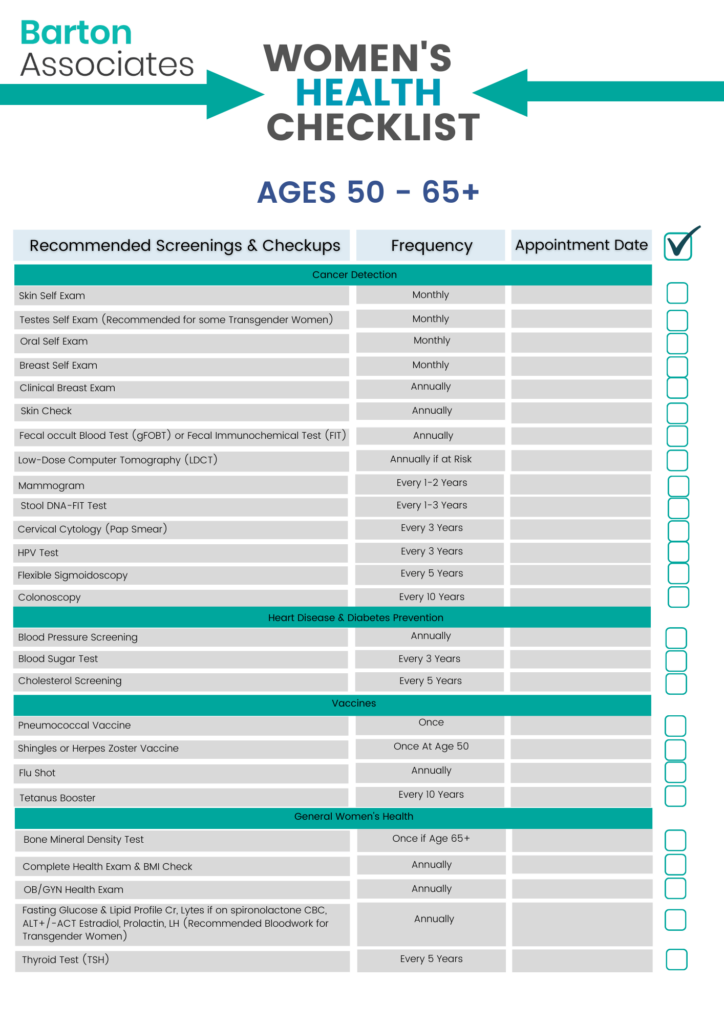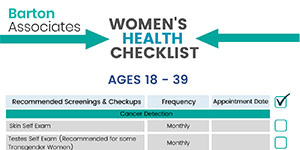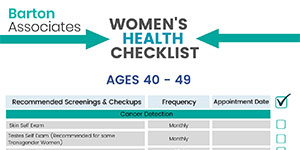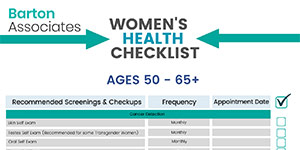Complete Women's Health Checklist for Women Aged 50-65+

STAYING ORGANIZED AS APPOINTMENTS START TO ADD UP
Heart disease, cancer, and lower respiratory diseases are the top three killers of women in the United States. Making up almost 50% of all deaths in American women. The chances of developing these diseases and their risk factors only increases as women get older. The number and frequency of doctors appointments increases as well.
Our annual physical exam checklist for women over 50 compiles all the tests, screenings, exams, and vaccines you need. We organize your appointments by breaking them up into easy-to-understand categories by purpose and frequency.
Download Your Complete Women’s Health Checklist for Ages 50-65+

When calling your doctor to schedule checkups and tests, it’s helpful to know what you’ve just scheduled, and why it’s important! Read on to see the recommended screenings, checkups, and vaccines in our Women’s Health Checklist for Women Aged 50-65+.
Complete Health Exam
- An assessment of overall health utilizing tests often ordered during your annual wellness visit. Mainly to evaluate health concerns common among men. Your doctor may also go over your family’s health history.
Clinical Breast Exam
- A physical examination of the breasts performed by a physician. Checking for any lumps or changes to detect breast cancer.
Skin Check
- A head to toe skin examination and discussion of your concerns and medical history with a physician. Done either as a part of your routine annual check up, or with a dermatologist.
BMI Check
- A calculation of a person’s body fat percentage using height and weight. Used to screen for risk factors that may lead to health problems.
Cervical Cytology
- Also called a Pap test or Pap smear. A cervical cytology is the study of cells taken from the cervix using a microscope. Screens for cervical cancer by detecting changes in the cells of the cervix.
Mammogram
- X-ray imaging of the breasts done by pressing each breast between two plastic plates and taking an x-ray photo. Detects early signs of breast cancer.
HPV Test
- A physician checks for high risk HPV types by collecting and testing a sample of cells from the cervix. A small spatula, brush, or swab collects the cells.
Blood Pressure Screening
- A measurement of the pressure in your arteries as your heart pumps. A doctor checks your blood pressure using an arm cuff inflated with air, and a stethoscope to listen to your blood flow.
Blood Sugar Test
- A blood test which measures the level of glucose (sugar) in your blood to screen for diabetes.
Cholesterol Screening
- A blood test which measures your cholesterol levels and specific fats in your blood. There are two main types of cholesterol that it measures.
- Low-density lipoprotein (LDL), or “bad” cholesterol is the main source of artery blockages.
- High-density lipoprotein (HDL), or “good” cholesterol, gets rid of LDL cholesterol.
Flu Shot
- An annual vaccination that prevents the influenza virus.
Tetanus Booster
- A vaccination that prevents against tetanus, an infection caused by Clostridium tetani bacteria.
Pneumococcal Vaccine
- A vaccine which protects against pneumococcal disease, caused by an infection of streptococcus pneumoniae bacteria.
Shingles Vaccine
- A vaccine which protects against shingles, a viral infection that causes a painful rash.
Herpes Zoster Vaccine
- A vaccine administered in two doses which protects against shingles, a viral infection that causes a painful rash.
OB/GYN Health Exam
- An assessment with your OB/GYN healthcare provider. Includes a pelvic exam, a Pap smear, a breast exam, and an assessment of your overall health status.
Fasting glucose and lipid profile CBC, ALT/-AST, Free and Total Testosterone
- Recommended for transgender women.
- Fasting glucose and lipid profile: A blood test including measurements for cholesterol and your fasting blood sugar level.
- ALT/-AST: A Blood test which measures different types of liver enzymes to detect liver damage.
- Free and total testosterone: A blood test that measures the levels of free testosterone and total testosterone in your blood. Used to diagnose various conditions. Free testosterone is unattached to a protein. Total testosterone includes both free testosterone and testosterone attached to a protein.
Guaiac-Based Fecal Occult Blood Test (gFOBT)
- A fecal test that checks for hidden blood in the stool. Placing stool on cards coated with a chemical substance (guaiac), and sending the sample to a laboratory for testing.
Fecal Immunochemical Test (FIT)
- A fecal test that checks for hidden blood in the stool by placing a small sample of stool into a collection tube for testing.
Low Dose Computed Tomography (LDCT)
- A procedure that gives off a low dose of radiation to take detailed pictures of the inside of the body. Checks for abnormalities that may point to lung cancer, using a computer attached to an x-ray machine.
Stool DNA-FIT Test
- A test that combines an FIT test and another test which detects altered DNA in stool by collecting a stool sample. A laboratory checks for the presence of blood and altered DNA.
Flexible Sigmoidoscopy
- An endoscopic procedure where your doctor examines the rectum and lower colon. Uses a sigmoidoscope (a thin, flexible, lighted tube with a camera at the tip) to visualize the area.
Colonoscopy
- An exam used to detect changes or abnormalities in the colon (large intestine) and rectum. Inserts a colonoscope (a long flexible tube with a small camera at the tip) into the rectum which allows the doctor to view inside the entire colon.
STD Screening
- A blood test to find out if you have been infected with a sexually transmitted disease. Whether or not your doctor orders STD screening can depend on how sexually active you are.
Each of these tests and exams are crucial for preventative health. To help you with your women’s wellness exam checklist, here are some self exams:
Oral Self Exam Guidelines
Skin Self Exam Guidelines
Breast Self Exam Guidelines
Below are our annual physical exam checklists by age. For younger women, check our our annual physical exam checklist for women ages 18-39 or 40-49.
This article was originally written by the Barton Team in July 2022. It was updated by Desirae Sin in May 2024 to reflect current information.


